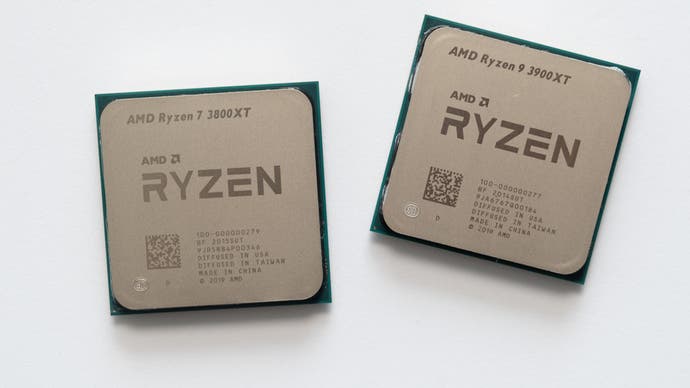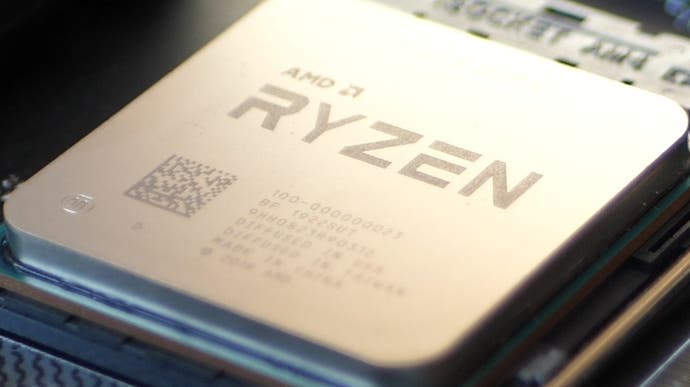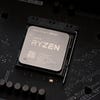AMD Ryzen 9 3900XT and Ryzen 7 3800XT review: microevolution
Two of AMD's latest tested on the new B550 platform.
A year to the day after releasing its landmark 3rd-gen Ryzen desktop CPUs, AMD has released a trio of new 'XT' processors that take advantage of manufacturing improvements to hit higher clock speeds. Two chips, the Ryzen 5 3600XT and Ryzen 9 3900XT, get a 100MHz frequency boost, while the Ryzen 7 3800XT is 200MHz faster than its 'X' equivalent. Otherwise, the models are more or less identical - the same core counts, cache sizes and overall architecture. We've been testing the Ryzen 7 and 9 models for the past week, and we think that they're a definite boon for anyone planning a Ryzen build - but perhaps not for the reasons you'd expect.
Before we get into the results of our content creation and game testing, let's briefly set the scene. One of the most critical things to know about these new models is that they are a supplement to the existing third-gen Ryzen lineup, rather than a (partial) replacement. That means that the older models - 3600X, the 3800X and the 3900X - will stay on the market, at least for the immediate future. While both the 'X' released a year ago and the 'XT' models releasing now actually share exactly the same recommended retail price, the original processors have naturally become cheaper over time, so in actuality there's a sizeable gap between the two lines. Here's how things currently shape up, as of early July 2020:

| Model | UK price | US price |
|---|---|---|
| AMD Ryzen 5 3600X | £205 | $225 |
| AMD Ryzen 5 3600XT | £250 | $250 |
| AMD Ryzen 7 3800X | £280 | $330 |
| AMD Ryzen 7 3800XT | £400 | $400 |
| AMD Ryzen 9 3900X | £410 | $420 |
| AMD Ryzen 9 3900XT | £500 | $500 |
So in the UK, there's a £45 premium in the case of the 3600XT, £120 (!) for the 3800XT and £90 for the 3900XT. Things are a bit different in the US, where the price differentials look to be closer to $25 for the 3600XT, $70 for the 3800XT and $80 for the 3900XT. These margins will fluctuate over time, especially just after the initial launch period, so be sure to check the current prices yourself if you're trying to decide between an 'X' or an 'XT'. Fundamentally though, the question remains the same: how much is an extra 100 or 200MHz worth? What extra performance can a clock speed bump of this size provide?
Let's begin to answer that by briefly discussing our test setup, before we start looking at some content creation results and then move into the gaming benchmarks. We tested each processor on our standard Windows 10 installation, updated to the most recent version (2004) to ensure that all of the latest security fixes and CPU topology awareness improvements are in place. The most recent AMD chipset drivers were also installed. Each app and game we tested was installed to fast NVMe storage, in this case the XPG Spectrix S40G.
We performed the bulk of our AMD testing on the venerable Asus ROG Crossfire 7 X470 motherboard, with additional testing on two new B550 boards: the premium Asus ROG Strix B550-F Gaming Wi-Fi and the more mid-range Asus TUF B550M-Plus Wi-Fi. We'll discuss B550 in more detail later in this review, but suffice it to say that choosing a platform that supports PCIe 4.0 and a future generation of AMD Zen 3 processors makes a lot of sense if you want to keep your options open for easy CPU, GPU and storage upgrades down the line.
For our Intel chips, we used the high-end MSI MPG Gaming Carbon Wifi and the ultra-premium Asus ROG Maximus 12 Extreme motherboards for our 10th-gen testing, with our ninth-gen results on the Asus ROG Maximus 11 Extreme.
We have also evolved our cooling setup since our last review, with the XT processors getting the benefit of AiO cooling from the Alphacool Eisbaer Aurora 240. We didn't experience any thermal throttling with our previous setup, AMD's excellent Wraith Prism air cooler pegged at 100 per cent fan speed, but this provides a more apples-to-apples comparison with our Intel parts which have historically been paired with a Gamer Storm Castle 240mm AiO. Thanks to Overclockers and Alphacool for supplying the new AiOs.
While motherboards and coolers changed, the remainder of our open air test rig has stayed the same, complete with G.Skill's gorgeous Trident Z Royal 3600MHz C16 RAM, an 850W Gamer Storm power supply and the Nvidia GeForce RTX 2080 Ti Founders Edition card.
Right - with that preamble out of the way, let's get into the content creation results. We tested the two XT processors sampled to us against a selection of recent chips from both Intel and AMD in two scenarios: rendering a 3D scene in professional graphics package Cinema 4D, simulated by Cinebench R20, and encoding one of Patreon-quality videos into both h.264 and h.265 (HEVC) using the open source Handbrake video transcoder app.
Cinebench tests both single and multi-threaded performance, and often proves a good predictor of trends we'll see in the later gaming results. What stands out here is the boost to single-core performance in each of the XT models we tested, with scores of around 540 - that's five per cent faster than the 514 we recorded for the 3900X and 3950X, the previous best single-core competitors from AMD. That pushes the 3800XT and 3900XT very close to the best Cinebench single thread result we've ever recorded, a score of 545 by the Core i9 10900K.
When it comes to multi-threaded performance, we see slightly higher scores from the XT models, but the advantage is much more modest - we recorded a score of 7101 for the 3900XT and 7032 for the 3900X, a difference of only about one per cent. The 3800XT gets a larger +200MHz boost compared to its predecessor, but it's still in the same ballpark (5164) as another eight-core CPU, the 3700X (4730).
| CB R20 1T | CB R20 MT | HB h.264 | HB HEVC | HEVC Power Use | |
|---|---|---|---|---|---|
| Ryzen 9 3950X | 514 | 9249 | 64.73fps | 25.59fps | 296W |
| Ryzen 9 3900XT | 538 | 7101 | 51.91fps | 20.49fps | 221W |
| Ryzen 9 3900X | 514 | 7032 | 51.80fps | 20.29fps | 228W |
| Ryzen 7 3800XT | 540 | 5164 | 37.14fps | 15.83fps | 177W |
| Ryzen 7 3700X | 494 | 4730 | 35.05fps | 14.67fps | 152W |
| Ryzen 5 3600X | 490 | 3705 | 27.54fps | 11.81fps | 149W |
| Ryzen 3 3300X | 503 | 2577 | 18.89fps | 8.25fps | 120W |
| Ryzen 3 3100 | 449 | 2328 | 17.32fps | 7.44fps | 118W |
| Ryzen 7 2700X | 408 | 3865 | 27.31fps | 10.04fps | 224W |
| Ryzen 5 2600 | 399 | 2810 | 20.39fps | 7.09fps | 130W |
| Core i9 10900K | 545 | 6337 | 45.55fps | 19.43fps | 268W |
| Core i5 10600K | 493 | 3587 | 26.40fps | 11.84fps | 177W |
| Core i9 9900K | 520 | 5090 | 37.87fps | 16.22fps | 266W |
| Core i7 9700K | 486 | 3759 | 28.77fps | 13.12fps | 171W |
| Core i5 9600K | 450 | 2603 | 20.70fps | 9.46fps | 132W |
Looking at the Handbrake results, where we're transcoding an MP4 video to h.264 and HEVC using the Production Standard preset and CRF 18 quality setting, it's a similar story with minor but measurable increases across the board. So, for tasks like rendering or transcoding where you're using all the cores and threads at your disposal, the advantage in hitter higher frequencies seems subtle. This suggests that content creators will be better off with the cheapest chip that has the number of cores and threads you want - ie the 3600 for six cores, the 3700X for eight and the 3900X for twelve.
We also measured power consumption in these tests, but as promised the new XT models didn't draw any more power at the wall than their predecessors - indeed, the 3900XT drew slightly less, which is great to see.
So it's a bit of a wash between 'X' and 'XT' for content creation, but what about gaming? To find out, let's take a look at how each chip performs in some of our favourite games, tested at 1080p, 1440p and 4K.
As usual, we paired each processor with the RTX 2080 Ti, the fastest consumer GPU available, to ensure we're CPU-limited as much as possible. These results should still be illuminating even if you're on a slower GPU though, as we'd expect similar gaps in performance even from mainstream GPUs at 1080p. To give you some context, an RTX 2080 Ti at 4K (as tested here) provides roughly equivalent performance to a GTX 1660 running at 1080p. Higher resolutions, like 1440p and 4K, ought to be more dependent on GPU performance - especially in the challenging game scenes we've selected - but differences from CPU to CPU can still crop up, so do look at the full range of results. Likewise, we encourage you to read other Ryzen 3800XT and 3900XT reviews to gain a more comprehensive understanding of how these processors perform in a wider range of scenarios.
With all that said, let's get started!
AMD Ryzen 9 3900XT and Ryzen 7 3800XT analysis
- Introduction, hardware breakdown, test system [This Page]
- Gaming benchmarks: Assassin's Creed Odyssey, Battlefield 5, Far Cry 5
- Gaming benchmarks: Crysis 3, Metro Exodus, Kingdom Come Deliverance, The Witcher 3
- Gaming benchmarks: Memory bandwidth analysis
- AMD Ryzen 9 3900XT: the Digital Foundry verdict















